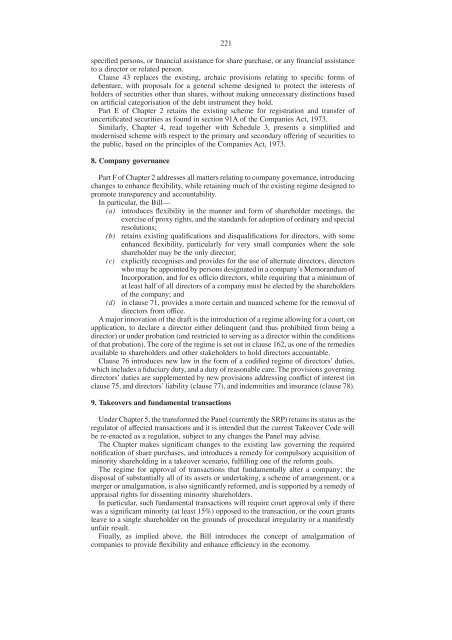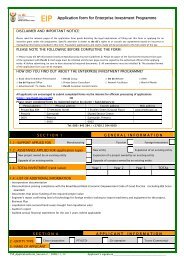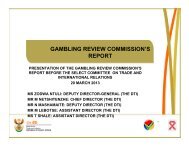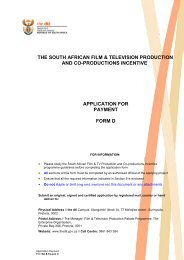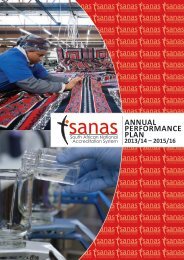COMPANIES BILL - Department of Trade and Industry
COMPANIES BILL - Department of Trade and Industry
COMPANIES BILL - Department of Trade and Industry
You also want an ePaper? Increase the reach of your titles
YUMPU automatically turns print PDFs into web optimized ePapers that Google loves.
specified persons, or financial assistance for share purchase, or any financial assistanceto a director or related person.Clause 43 replaces the existing, archaic provisions relating to specific forms <strong>of</strong>debenture, with proposals for a general scheme designed to protect the interests <strong>of</strong>holders <strong>of</strong> securities other than shares, without making unnecessary distinctions basedon artificial categorisation <strong>of</strong> the debt instrument they hold.Part E <strong>of</strong> Chapter 2 retains the existing scheme for registration <strong>and</strong> transfer <strong>of</strong>uncertificated securities as found in section 91A <strong>of</strong> the Companies Act, 1973.Similarly, Chapter 4, read together with Schedule 3, presents a simplified <strong>and</strong>modernised scheme with respect to the primary <strong>and</strong> secondary <strong>of</strong>fering <strong>of</strong> securities tothe public, based on the principles <strong>of</strong> the Companies Act, 1973.8. Company governancePart F <strong>of</strong> Chapter 2 addresses all matters relating to company governance, introducingchanges to enhance flexibility, while retaining much <strong>of</strong> the existing regime designed topromote transparency <strong>and</strong> accountability.In particular, the Bill—(a) introduces flexibility in the manner <strong>and</strong> form <strong>of</strong> shareholder meetings, theexercise <strong>of</strong> proxy rights, <strong>and</strong> the st<strong>and</strong>ards for adoption <strong>of</strong> ordinary <strong>and</strong> specialresolutions;(b) retains existing qualifications <strong>and</strong> disqualifications for directors, with someenhanced flexibility, particularly for very small companies where the soleshareholder may be the only director;(c) explicitly recognises <strong>and</strong> provides for the use <strong>of</strong> alternate directors, directorswho may be appointed by persons designated in a company’s Memor<strong>and</strong>um <strong>of</strong>Incorporation, <strong>and</strong> for ex <strong>of</strong>ficio directors, while requiring that a minimum <strong>of</strong>at least half <strong>of</strong> all directors <strong>of</strong> a company must be elected by the shareholders(d)221<strong>of</strong> the company; <strong>and</strong>in clause 71, provides a more certain <strong>and</strong> nuanced scheme for the removal <strong>of</strong>directors from <strong>of</strong>fice.A major innovation <strong>of</strong> the draft is the introduction <strong>of</strong> a regime allowing for a court, onapplication, to declare a director either delinquent (<strong>and</strong> thus prohibited from being adirector) or under probation (<strong>and</strong> restricted to serving as a director within the conditions<strong>of</strong> that probation). The core <strong>of</strong> the regime is set out in clause 162, as one <strong>of</strong> the remediesavailable to shareholders <strong>and</strong> other stakeholders to hold directors accountable.Clause 76 introduces new law in the form <strong>of</strong> a codified regime <strong>of</strong> directors’ duties,which includes a fiduciary duty, <strong>and</strong> a duty <strong>of</strong> reasonable care. The provisions governingdirectors’ duties are supplemented by new provisions addressing conflict <strong>of</strong> interest (inclause 75, <strong>and</strong> directors’ liability (clause 77), <strong>and</strong> indemnities <strong>and</strong> insurance (clause 78).9. Takeovers <strong>and</strong> fundamental transactionsUnder Chapter 5, the transformed the Panel (currently the SRP) retains its status as theregulator <strong>of</strong> affected transactions <strong>and</strong> it is intended that the current Takeover Code willbe re-enacted as a regulation, subject to any changes the Panel may advise.The Chapter makes significant changes to the existing law governing the requirednotification <strong>of</strong> share purchases, <strong>and</strong> introduces a remedy for compulsory acquisition <strong>of</strong>minority shareholding in a takeover scenario, fulfilling one <strong>of</strong> the reform goals.The regime for approval <strong>of</strong> transactions that fundamentally alter a company; thedisposal <strong>of</strong> substantially all <strong>of</strong> its assets or undertaking, a scheme <strong>of</strong> arrangement, or amerger or amalgamation, is also significantly reformed, <strong>and</strong> is supported by a remedy <strong>of</strong>appraisal rights for dissenting minority shareholders.In particular, such fundamental transactions will require court approval only if therewas a significant minority (at least 15%) opposed to the transaction, or the court grantsleave to a single shareholder on the grounds <strong>of</strong> procedural irregularity or a manifestlyunfair result.Finally, as implied above, the Bill introduces the concept <strong>of</strong> amalgamation <strong>of</strong>companies to provide flexibility <strong>and</strong> enhance efficiency in the economy.


